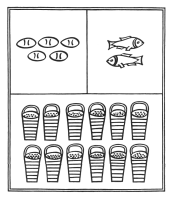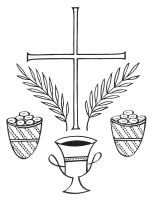Biblical Background for the Christian Eucharist:
The Catholic Mass is not only based on the "Last Supper" that Jesus had with his disciples, but is also influenced by a long history of special meals celebrated by ancient Jews and early Christians, both before, during, and after the lifetime of Jesus:
- The first Passover meal of the Israelites in Egypt (Exod 12:1-28)
- The annual Jewish Passover meals (Exod 12:43-51; Lev 23:4-14; Num 9:1-14; 28:16-25; Deut 16:1-8)
- Jesus' feeding of the 5000 in Galilee (Mark 6:30-44; Matt 14:13-21; Luke 9:10-17; John 6:1-14)
- Jesus' feeding of another crowd of 4000 people (Mark 8:1-10; Matt 15:32-39)
- Jesus' Last Supper with his disciples (Mark 14:12-27; Matt 26:17-30; Luke 22:7-39; cf. 1 Cor 11:23-25)
- The risen Jesus' meal with two disciples at Emmaus (Luke 24:13-35)
- The risen Jesus' breakfast at the Sea of Galilee (John 21:1-14)
- Early Christians in Jerusalem share in the "Breaking of the Bread" (Acts 2:42-47)
- Early Christians in Troas "break bread" with Paul (Acts 20:5-11)
- Early Christians in Corinth celebrate the "Lord's Supper" (1 Cor 10:16-17; 11:17-34)
- for a compilation of these biblical texts, click here
Use of Scripture in Early Christian Worship:
From the very beginning, Christian worship has not only involved the sharing of bread and wine in a ritual meal, but also readings from the sacred scriptures (as also done in Jewish synagogue services). Early Christians not only read from the Jewish scriptures, but soon also included some writings of Christian leaders:
- Jesus reads from the book of the prophet Isaiah during a synagogue service (Luke 4:16-22, citing Isa 61:1-2)
- The risen Jesus explains the meaning of the scriptures to two disciples (Luke 24:25-47)
- The apostles base their preaching on the scriptures (Acts 2:14-36; 7:2-53; 17:1-11)
- Christians read from the books of "the Law and the Prophets" (Acts 13:15-44)
- The scriptures are applied to all aspects of Christian life (2 Tim 3:15-16)
- The letters of Paul are already considered "scripture" (2 Peter 3:15-17)
Biblical Background of Liturgical Texts:
The words spoken by the priests and the people during the Catholic Mass and other Christian liturgies are not only based loosely on the Bible; many of them are direct quotations from particular biblical texts:

Introductory Rites:
- Sign of the Cross: "In the name of the Father, and of the Son, and of the Holy Spirit."
(see Matt 28:19; cf. John 14:13-14; Acts 2:21)- Formal Greeting:
- "The grace of our Lord Jesus Christ..." (2 Cor 13:14)
- "The grace and peace of God our Father..." (Eph 1:2)
- "The Lord be with you." (2 Tim 4:22; cf. Matt 1:23; 28:20)
- Rite of Blessing and Sprinkling Holy Water (see Ezek 36:25; cf. Num 8:7a)
- Penitential Rite:
- "I confess to almighty God..." (cf. Lev 5:5; Neh 1:5-9; Dan 9:3-19; James 5:16)
- "Lord, Have Mercy" ( Matt 15:22; 17:15; 20:30-31; cf. Ps 123:3)
- "Glory to God in the highest..." (Luke 2:14; cf. Rev 4:11; 5:11-14)
- Prayers concluded by "Amen" (Neh 8:6; Ps 41:13; Rom 16:27; Heb 13:20-21; Rev 7:16)
Liturgy of the Word:
- Introductory/Concluding Dialogues:
- "A reading from the book/letter of..."
- "The Word of the Lord" - "Thanks be to God"
- "A reading from the holy Gospel according to..." - "Glory to you, O Lord"
- "The Gospel of the Lord" - "Praise to you, Lord Jesus Christ"
- Acclamations before the Gospel:
- "Alleluia" (many Psalms, esp. Ps 146-150; Rev 19:1-6)
- "Praise to you, Lord Jesus Christ, King of endless glory!" (cf. Ps 24:7-10; 1 Thess 2:12; 2 Tim 4:18)
- "Praise and honor to you, Lord Jesus Christ!" (cf. Dan 4:34, 37; 1 Peter 1:7)
- "Glory and praise to you, Lord Jesus Christ!" (cf. Phil 1:11)
- Profession of Faith:
- "We believe..." (Mark 9:24; John 11:27; cf. John 14:1; 1 John 5:10)
- General Intercessions:
- "We pray to the Lord" - "Lord, hear our prayer"
Liturgy of the Eucharist:
- Preparation of the Gifts: "Blessed are you, Lord, God of all creation..." (cf. 1 Chron 29:10; Ps 72:18-19; 119:10; Luke 1:68)
- Eucharistic Acclamations:
- "Holy, Holy, Holy Lord, God of power and might..." (Isa 6:3; Rev 4:8)
- "Blessed is he who comes in the name of the Lord." (Ps 118:26; Mark 11:10)
- Words of Institution: "Take, eat, this is my body..." (Mark 14:22-24; Matt 26:26-28; Luke 22:19-20; 1 Cor 11:23-25)
- Memorial Acclamations:
- "Christ has died; Christ is risen; Christ will come again." (cf. 1 Thess 4:14-15; 1 Cor 15:3-23)
- "Dying you destroyed our death, rising you restored our life. Lord Jesus, come in glory." (cf. 1 Cor 16:22)
- "When we eat this bread and drink this cup, we proclaim your death, Lord Jesus, until you come in glory." (cf. 1 Cor 11:26)
- "Lord, by your cross and resurrection, you have set us free. You are the Savior of the world." (cf. Luke 4:42)
- Lord's Prayer: "Our Father in heaven..." (Matt 6:9-13; cf. Luke 11:2-4; Mark 14:36; Gal 4:6)
- Doxology: "For the kingdom, the power, and the glory are yours..."
(found only in some biblical manuscripts after Matt 6:13; cf. Rev 4:11; 1 Chron 29:11)- Greeting of Peace: "The peace of the Lord be with you always." (cf. John 14:27; 16:33; 20:19-20; 20:26)
- Breaking of the Bread: "Lamb of God, you take away the sins of the world..." (cf. John 1:29, 36; cf. Rev 5:6-13; 22:1-3)
- Preparation before Communion: "Lord, I am not worthy to receive you, but only say the word and I shall be healed." (cf. Luke 7:1-10)
Concluding Rite:
- Final Blessing (cf. Gen 28:3; Deut 14:29; Num 6:23-27; Ps 29:11)
- Dismissal:
- "Go in the peace of Christ."
- "The Mass is ended; go in peace."
- "Go in peace to love and serve the Lord." (cf. Deut 10:11-13; Judg 18:6; Luke 7:50)
The Liturgy of the Hours and Other Prayers:
- The Canticle of Mary (Magnificat):
- "My soul proclaims the greatness of the Lord..." (Luke 1:46-53)
- The Canticle of Zechariah (Benedictus):
- "Blessed be the Lord, the God of Israel..." (Luke 1:68-79)
- The Canticle of Simeon (Nunc Dimittis):
- "Lord, now let your servant go in peace..." (Luke 2:29-32)
- The Hail Mary (Ave Maria):
- "Hail Mary, full of grace, the Lord is with you." (Luke 1:28)
- "Blest are you among women, and blessed is the fruit of your womb." (Luke 1:42; cf. Deut 7:12-13; 28:















